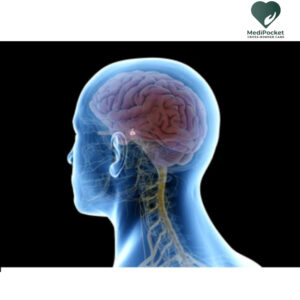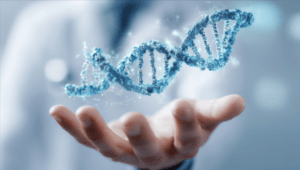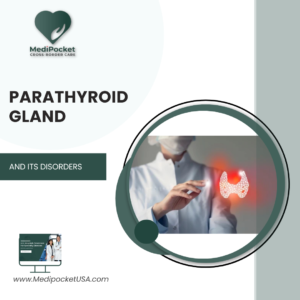The pituitary gland, often known as the master gland, is a pea-sized gland near the base of the brain. Despite its modest size, it is critical to the body’s optimal functioning. The pituitary gland is in charge of creating and releasing hormones that regulate a variety of biological activities such as growth and development, metabolism, reproductive functions, and stress response. It is linked to the hypothalamus, which regulates pituitary gland hormone secretion.

The pituitary gland is split into two halves, anterior and posterior pituitary, and each produces a separate hormone. Among other things, the anterior pituitary gland generates hormones that govern growth and development, reproduction, and thyroid function. The posterior pituitary gland secretes hormones that regulate the body’s water balance. Dysfunction of the pituitary gland can lead to a variety of health problems, including hormone imbalances and pituitary tumors.
Anterior pituitary gland
The adenohypophysis, or anterior pituitary gland, is a pea-sized gland found near the base of the brain. It is a component of the endocrine system that generates and secretes hormones that govern many bodily activities.
Each of the five unique cell types in the anterior pituitary gland generates a separate hormone. Among these hormones are:
- Growth Hormone (GH): This hormone boosts the body’s growth and cell reproduction.
- Thyroid-Stimulating Hormone (TSH): stimulates the thyroid gland to make and release thyroid hormones, which control metabolism.
- Adrenocorticotropic Hormone (ACTH): This hormone stimulates the adrenal glands to create and release cortisol, a stress-response hormone.
- FSH (Follicle-Stimulating Hormone): This hormone regulates the reproductive system, especially the formation and maturation of eggs in females and sperm in males.
- Luteinizing Hormone (LH): This hormone regulates the reproductive system, specifically the generation of estrogen and progesterone in females and testosterone in males.
The hypothalamus, a portion of the brain that generates hormones that govern pituitary gland hormone release, regulates the anterior pituitary gland. The anterior pituitary gland’s dysfunction or injury can result in a range of hormonal imbalances and diseases.
Posterior pituitary gland
The posterior pituitary gland is a tiny expansion of brain neural tissue lying underneath the hypothalamus. It, unlike the anterior pituitary gland, does not produce hormones. Instead, it stores and releases two hypothalamic chemicals, oxytocin and vasopressin (also known as antidiuretic hormone or ADH).
Oxytocin is essential for reproductive function because it increases uterine contractions during delivery and promotes nursing. It also contributes to social bonding by encouraging sentiments of trust and intimacy among individuals.
Vasopressin, on the other hand, maintains the body’s water balance. It works on the kidneys to lower the quantity of water lost in urine, which helps the body maintain optimum fluid balance. It also has a role to play.
Overall, the posterior pituitary gland plays a crucial role in regulating critical activities such as water balance, blood pressure, and reproductive function.
What are the disorders of the pituitary gland?
Pituitary gland disorders can arise for a variety of causes, including tumors, infections, and accidents. Following are some of the most prevalent pituitary gland disorders:
Pituitary Tumors: These are benign or malignant growths that can produce a range of symptoms depending on their location and size. Certain pituitary tumors can induce overproduction of hormones, resulting in illnesses such as acromegaly (excess growth hormone), Cushing’s disease (excess cortisol), and prolactinoma (excess prolactin).
Hypopituitarism: it is a disorder in which the pituitary gland produces insufficient hormones. It is caused by pituitary gland injury, such as by radiation therapy or surgery, or by genetic abnormalities.
Diabetes insipidus: Diabetes insipidus develops when the pituitary gland does not generate enough antidiuretic hormone (ADH), which regulates the body’s water balance. Excessive thirst and frequent urination are symptoms.
Hyperprolactinemia: Hyperprolactinemia is a disorder in which the pituitary gland generates excessive prolactin, resulting in infertility and breast milk production in women who are not pregnant or nursing.
Sheehan’s Syndrome: it is an uncommon condition that arises when the pituitary gland is injured after delivery owing to excessive haemorrhage. It can result in weariness, weight loss, and low blood pressure.
Symptoms of pituitary gland disorders?
The symptoms of pituitary gland problems vary greatly depending on the condition and the hormones involved. The following are some frequent symptoms of pituitary gland disorders:
- Headache: Pituitary gland abnormalities can induce headaches, especially those that occur behind the eyes or at the front of the head.
- Vision problems: Because the pituitary gland is so close to the optic nerves, any swelling or development in the gland might cause visual issues.
- Menstrual cycle changes: Women may have menstrual cycle changes, such as irregular periods or a complete lack of periods.
- Erectile dysfunction: Changes in testosterone levels can cause a reduction in libido or erectile dysfunction in men.
- Growth issues: Pituitary gland diseases can cause poor development or delayed puberty in children.
- Fatigue and weakness: these are frequent symptoms of pituitary gland problems because of hormonal abnormalities that impact energy levels.
- Weight gain: Increased cortisol levels caused by an overactive pituitary gland can contribute to weight gain.
- Mood swings: Hormone imbalances produced by pituitary gland problems can induce anxiety and despair.
It is crucial to remember that these symptoms can be caused by a variety of reasons, and diagnosing a pituitary gland issue requires a full medical assessment.
Diagnosis
A pituitary gland problem is often diagnosed using a combination of medical history, physical examination, and laboratory investigations. Some of the most prevalent diagnostic tests for pituitary gland problems are as follows:
Blood and urine testing: Blood tests can identify the levels of pituitary hormones such as growth hormone, prolactin, and thyroid-stimulating hormone (TSH). Some hormones and their metabolites can also be detected in urine testing.
Imaging test: Magnetic resonance imaging (MRI) or computed tomography (CT) scans can aid in the detection of tumours or other structural abnormalities in the pituitary gland.
Visual field testing: Visual field testing may be performed to evaluate any visual abnormalities, particularly in individuals with pituitary tumours.
Hormone stimulation tests: They are used to assess the pituitary gland’s reaction to hormones. A growth hormone stimulation test, for example, consists of injecting a chemical that stimulates the pituitary gland to create growth hormone and then evaluating the response.
Genetic testing: In some cases of pituitary gland diseases, genetic testing may be advised, especially if the illness runs in the family.
Pituitary gland diseases may necessitate the services of an endocrinologist, a specialist in hormone-related ailments. Treatment choices will depend on the individual condition and its underlying cause after it has been recognized.
Treatment
Pituitary gland problems are treated differently depending on the kind and origin of the condition. The following are some popular therapeutic options:
Medicines
Drugs that address the underlying hormonal imbalances can be used to treat several pituitary gland problems. Acromegaly, for example, may be treated with drugs that reduce growth hormone production.
Surgery
Certain pituitary gland diseases need surgery to remove tumors or other growths that are interfering with the gland’s function. Surgery is usually needed for illnesses that cause major hormone imbalances, visual issues, or other consequences.
Radiation treatment
Radiation treatment can be used to decrease tumors that cannot be removed surgically or to treat cancers that have regrown after surgery.
Hormone replacement treatment
If a pituitary gland problem has resulted in a hormone shortage, hormone replacement therapy may be administered to restore normal hormone levels.
Monitoring
Pituitary gland diseases may not require treatment in certain circumstances, but rather monitoring to ensure that the illness does not worsen or create consequences.
Endocrinologists treat pituitary gland disorders. Pituitary gland diseases can have an impact on the gland’s function, thus it’s important to be on the lookout for probable indications of the disorders to avoid severe health consequences.
Endocrinologists in the United States are regarded to be the finest in diagnosing and treating disorders, not to mention the cutting-edge equipment in US hospitals that aids in the early detection of any type of sickness. As a result, MediPocket World virtually brings the greatest doctors from the best hospitals to Indian people. Those who desire to be treated by an American board certified expert will be able to do so through MediPocket. Register to connect with an endocrinology expert.









